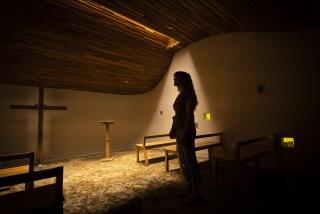Age-old conflict over God’s word
- Share via
Monotheists of every stripe -- Protestant, Roman Catholic, Eastern Orthodox, Jewish and Muslim -- worship the same God. Yet despite the potential for harmony inherent in this shared belief, many of history’s fiercest conflicts have been between believers with disparate versions of the same story. Each faith -- and within each faith, each sect -- considers itself the one true heir, a situation epitomized in the famous ring parable of Gotthold Lessing’s story “Nathan the Wise,” in which a king, equally fond of all three sons, bequeaths identical rings to the three, each of whom supposes his to be the only authentic one.
Yet each form of monotheism also contains elements conducive to mutual respect, tolerance and understanding. In “Whose Bible Is It?,” the eminent theological historian Jaroslav Pelikan reminds us of a moment in history, the Golden Age of Moorish Spain, when this was so:
“To a degree that is probably difficult even to imagine today, the three peoples of the Book coexisted ... in considerable amity and with a remarkable degree of toleration.... [O]ne cannot resist observing that it ill behooves an era of human history like this one to look back at the Middle Ages and think only of jihad or of the Crusades and pogroms without remembering these ... encounters when, at least for an occasional moment, Jews, Christians, and Muslims ... managed to transcend their separations without losing their identities.”
But discord has been more common than concord, and Pelikan’s focus is on the role played in that conflict by the Bible itself.
“The history of Jewish-Christian relations,” he observes, “and ... of the divisions within Christendom, is at one level the history of biblical interpretation. The parties have faced each other across a sacred page that they held in common but that only served to emphasize their separation.”
Pelikan’s central insight rests upon the crucial distinction between the written and spoken word. Scripture, of course, is written. Yet God, like Jesus and Socrates, did not write but spoke. Scripture, as Pelikan explains, can never be more than a partial record or approximation of the Word of God: “To comprehend the written Bible ... it is essential to understand that most of the words which are now written down in it had been spoken first and, therefore, they had been heard long before they could ever have been read.”
Beginning with an illuminating look at the original Hebrew Bible, Pelikan takes us down through the centuries, offering a crisp, remarkably succinct history of the Bible as preserved, interpreted, translated and canonized by the various faiths that believed in it. Too often, he shows, obsessive focus on the written word obscured the spirit behind the word.
Surveying Jewish and Christian interpretative traditions, Pelikan usefully portrays the Talmud as a continual effort to understand the spirit behind the written word. He sees a parallel to this in the Christian effort to reinterpret the Old Testament as presaging the New. His account of the formation of the New Testament (compared, say, with Elaine Pagels’ in “Beyond Belief”) is rather brief, and he seems less sympathetic -- or, at any rate, more neutral -- than Pagels toward the Gospels that did not survive the winnowing process.
St. Jerome’s Latin “Vulgate” Bible, the Renaissance revival of Greek and Hebrew, the Reformation, the Enlightenment and the contributions of historical-critical scholarship are duly narrated and elucidated. Pelikan rightly reminds us just how much the desire to understand the Old Testament in the original Hebrew and the New Testament in the original Greek motivated the Renaissance revival of classical learning. But elsewhere he tends to understate the role of scientific thinking and rationalism as cultural and intellectual forces. It is also surprising, given the overall clarity and judiciousness distinguishing this book, to occasionally come across topics that are not adequately explained or developed.
The author of many magisterial books on Christian tradition, Pelikan writes from the perspective of a believer as well as a scholar. For him, the Bible is more than great literature: “Even in a secular age ... the Bible proves to be the unique antidote to cynicism and the source of inspiration for poets and philosophers, artists and musicians, and the countless millions all over the globe who turn to it every day and in their times of need.... [It] provides the subtext ... for how we deal with life and death and how we define our deepest hopes.”
Movingly, it is this scholar’s profound reverence for the Bible that leads him to conclude that “the Bible is the book of God and the Word of God, and therefore does not belong to any of us.... To speak of possessing the Bible or even to ask ‘Whose Bible is it?’ is ... not only presumptuous, but blasphemous.”
Merle Rubin is a contributing writer to Book Review.
More to Read
Sign up for our Book Club newsletter
Get the latest news, events and more from the Los Angeles Times Book Club, and help us get L.A. reading and talking.
You may occasionally receive promotional content from the Los Angeles Times.










